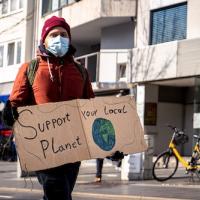This ICLEI Declaration was adopted unanimously at the Joint Meeting of the ICLEI Council and ICLEI Global Executive Committee at Paris City Hall on 6 December 2015
In these days, the world anxiously follows your national and global efforts to collectively agree on an ambitious and inclusive global Paris Climate Package as the outcome of COP21.
With the recently adopted Sustainable Development Goals (SDGs), in particular Goal 11 on sustainable cities, all countries have a mandate and an obligation to create the necessary conditions for a peaceful and healthy planet. We expect that the Habitat III Conference next year on the new Urban Agenda will further strengthen these.
However, it will not be possible to transform our world towards a sustainable world without a clear commitment from Parties and a pathway towards low-carbon and high-resilient societies and economies.
A failure in Paris to agree on a global framework will worsen our life scenarios. We do not see the negotiations of this agreement as one among Parties but as one with people at risk.
We worriedly take note of the fact that the Intended Nationally Determined Commitments and Contributions (INDCs), curb the global GHG emission trajectory to only 2.7-5.0 °Celsius until the end of this century, and not below 2°C, as requested by the IPCC to ensure a climate-safe future for all people.
This will gravely impact the most vulnerable citizens and populations who suffer from the impacts of climate change that they have not caused.
In overall terms, we request Parties to provide an ambitious response to address 4 basic realities:
- the legacy of a fossil-dependent era and ineffectiveness of piecemeal solutions;
- the unstoppable transformation into a development model that is based on 100% renewables and a circular economy;
- the need to develop innovative governance models in a multi-polar, multi-stakeholder, multi-level Urban World of the 21st Century;
- the need to develop a global and sufficient framework to mobilize additional financial resources for climate change mitigation, adaptation and loss-and-damage through public as well as private finance, including carbon pricing, phasing out of fossil-fuel subsidies, divestment of carbon intensive infrastructure and other assets, and revenues to be generated from regulations on international finance markets or transactions.
Acknowledging the fact that some 50% of submitted INDCs refer to local and subnational action, we urge our Ministers to be more ambitious and to:
- Emphasize the importance of taking into account human rights, gender equality, rights of indigenous peoples, and the needs of particular vulnerable groups when taking action to address climate change;
- Confirm the recognition of the crucial role of local and subnational governments as governmental stakeholders and non-state actors, as key partners in the global climate efforts;
- Develop innovative processes to enhance engagement of local and subnational governments as governmental stakeholders, building on the experiences of the ADP Workstream-2 Technical Examination Processes, and the efforts through the Lima-Paris Action Agenda (LPAA);
- Adopt long-term mitigation goals with a clear vision and target for 2050, and for the end of the century, in particular goals on carbon/climate neutrality, phase-out of fossil fuels, and 100% renewables by the latest by 2050;
- Close the emission gap and accelerate the implementation of the pre-2020 mitigation commitments in particular by developed countries, so that transformation happens faster, based on the principles of differentiated responsibilities, equity, and solidarity;
- Support developing countries to achieve their mitigation INDCs, technically and financially, and adopt a finance plan that includes five year financial commitments and assessment periods to help achieve their pre-2020 and post-2020 goals;
- Agree on a global, periodic revision process, every five years, of the individual and aggregate implementation progress of the mitigation INDCs and their upscaling, with science and equity-based assessments, and with civil society participation;
- Set specific goals and targets for adaptation until 2050, including a financial target to reach at least 35 billion USD via grant-based provisions for developing countries,
- Create a robust framework that addresses loss and damage from the impacts of climate change; and
- Mobilize and ensure direct access to financing authority, legislative capacity, and other tools to maximize our climate change actions based on territorial/place-based approaches and empower each level of government, together with enhanced multilevel governance and vertical integration to make its maximum potential contribution toward climate change progress.
As the world's leading sustainability network of over 1,000 cities, towns and metropolises, and building on our Seoul Declaration and Strategy 2015-2021 adopted in April 2015, ICLEI commits to:
1. INSPIRE – EXPAND – SCALE UP LOCAL CLIMATE ACTION Our combined sustainability actions currently reach over 20% of the global urban population.
We commit to lead ICLEI members through our GreenClimateCities Program and other initiatives, and to mobilize more local and subnational governments so as to reach 30% by 2030 and 50% by 2050 of the global urban population, as well as to explore 100 % renewables scenarios by 2030 and 2050.
2. INTENSIFY – DEEPEN – INTEGRATE CLIMATE ACTION TO ALL AREAS OF SUSTAINABILITY Our ICLEI 10 Urban Agendas help our members to make their cities and regions sustainable, low-carbon, resilient, eco-mobile, biodiverse, resource-efficient and productive, healthy and happy, with a green economy and smart infrastructure.
Building on the achievements of our Low Carbon City Agenda, we commit to engage all our members in the 10 Urban Agendas and thus comply with SDG.11 by 2030 as well as mobilize more like-minded local and subnational governments.
3. CONNECT – INCLUDE – ENGAGE WITH GOVERNMENTS AND STAKEHOLDERS Our climate work since 1990, strengthened by the Local Government Climate Roadmap since 2007, has mobilized an unprecedented scale of political commitment and action towards a climate-friendly human development at our levels of government.
We commit to raise compliance with national, subnational, and global initiatives, including the Compact of Mayors, Compact of States and Regions, Mexico City Pact, Durban Adaptation Charter, Earth Hour City Challenge, Covenant of Mayors, working in partnership with citizens, the business sector, and other stakeholders.
We commit to support vertically integrated climate action and explore collaboration with national governments, in particular those that have included local and subnational climate action in their INDCs.
4. TRANSPARENT – ACCOUNTABLE – OPEN MUNICIPAL ACTIONS AND GOVERNANCE Our carbonn Climate Registry with publicly available commitments, emissions inventories and actions reported by more than 600 local and subnational governments, currently aggregates to 1 billion tons of GHG emission reductions until 2020.
We commit to expand the number of reporting entities to include all ICLEI members reporting in the carbonn Climate Registry, to annually aggregate these commitments and to report to the UNFCCC NAZCA.
5. RESOURCE – EMPOWER – ADVOCATE FOR TRANSFORMATIVE ACTION Our pilot of the Transformative Actions Program (TAP) 2015 has brought forward 125 applications to demonstrate ambitious, crosscutting, and inclusive local action plans that have the potential to contribute to keeping global warming below 2°C.
We commit to continuing the TAP on an annual basis, and present the applications to the climate finance institutions and programs. In addition, we commit to providing an interactive platform to share best TAP projects from around the world, as well as providing tools and knowledge systems necessary for local and subnational governments to design and implement transformative climate actions.
On 6 December 2015, we, ICLEI Global Executive Committee and Council members, together with this ICLEI Declaration, express our endorsement to the Paris City Hall Declaration of the Climate Summit for Local Leaders and the Paris Action Statement of Lima-Paris Action Agenda Cities and Subnational Working Group.
- Log in to post comments



CRC Comments